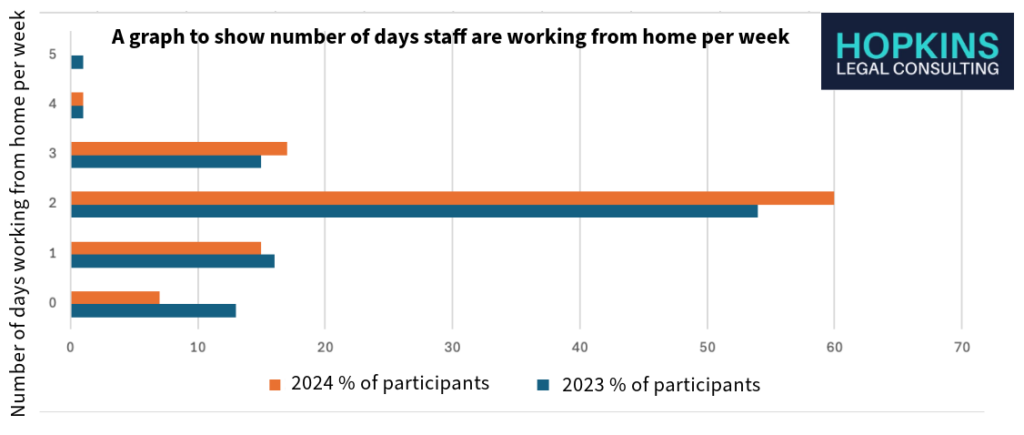Mastering Hybrid Working in Law Firms: Balancing Flexibility, Productivity, and Client Service
Hybrid working has reshaped the legal sector, offering flexibility but also unique challenges. This blog explores key considerations for law firms, informed by the NatWest survey findings on hybrid working trends.
Hybrid working has reshaped the legal sector, offering flexibility but also unique challenges. This blog explores key considerations for law firms, informed by the NatWest survey findings on hybrid working trends.
Insights from the Data

The graph illustrates the number of days staff work from home weekly, based on responses from 100 law firms. Notably:
- Two days per week is the most common arrangement in 2024, with 60% of firms adopting this model—up from 52% in 2023.
- Three days per week has also gained traction, reflecting increased flexibility.
- Minimal adoption of full-time remote work (five days) highlights the sector’s preference for hybrid over fully remote models.
These trends underscore the legal industry’s shift towards balancing flexibility with in-office collaboration.
Key Challenges and Strategies
- Balancing Confidentiality and Security Hybrid working raises data security concerns. Investments in cloud-based document management and encryption tools are essential for protecting client information.
- Preserving Client Relationships While flexibility boosts employee satisfaction, law firms must ensure client service isn’t compromised. Combining remote and in-person interactions is vital for maintaining trust and communication.
- Enhancing Collaboration and Knowledge Sharing Hybrid models must foster collaboration. Regular in-office meetings and mentorship opportunities can help maintain knowledge flow across teams.
- Tailoring Hybrid Models Different roles require varying levels of in-office presence. For instance, client-facing lawyers may benefit from more office time, while research-heavy roles might function well remotely.
- Maintaining Firm Culture Strong firm culture is critical in hybrid models. Regular team-building activities and transparent communication can strengthen connections between home-based and office-based staff.
The Road Ahead
Hybrid working models must evolve to address changing needs. Law firms that embrace this adaptability will attract top talent, improve work-life balance, and remain competitive.
As a law firm management consultant, I emphasise the importance of tailoring hybrid strategies to your firm’s needs. By fostering open communication and investing in the right tools, firms can achieve flexibility, productivity, and enhanced employee well-being.
If you would like to discuss hybrid working within your law firm contact Hopkins Legal Consulting here.
